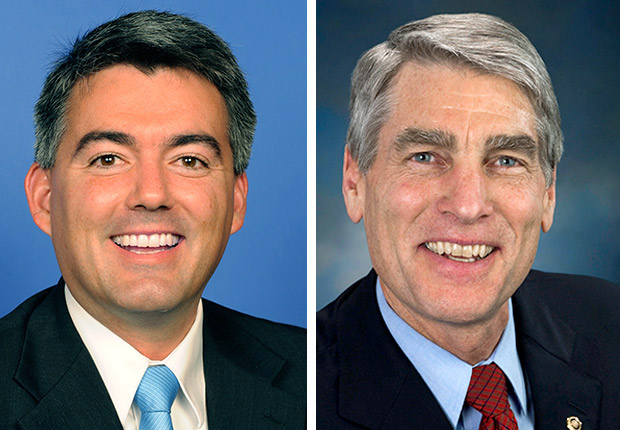AARP Hearing Center

By Cynthia Pasquale
Distinct differences over Social Security, Medicare and the Affordable Care Act separate Sen. Mark Udall and Rep. Cory Gardner in the U.S. Senate race in Colorado.
The candidates are a study in contrasts: Udall, 64, the first-term Democratic incumbent who previously served 10 years in the House, generally follows a Democratic agenda; Gardner, 40, elected to the House from the 4th Congressional District in 2010, most often sides with his Republican peers.
The AARP Bulletin asked candidates the same set of questions on issues affecting older residents. Udall’s campaign responded by email; Gardner’s campaign did not respond to repeated requests. His positions were drawn from his website, public statements and voting record.
Gardner is “dedicated to fiscal responsibility and government reform,” according to his website. In 2011, he voted for the “Cut, Cap, and Balance Act,” a budget-balancing proposal that would have cut, then capped, federal spending to reduce the nation’s debt. Opponents said the proposal would have reduced scheduled future spending on Social Security, Medicare and Medicaid.
Udall developed a budget bill in the Senate that would have prohibited Congress from instituting tax breaks for people earning $1 million or more and put Social Security in a “lockbox” to exempt the program from spending cuts.
Gardner has supported a proposal to change the way Social Security cost-of-living adjustments (COLAs) are calculated. The “chained CPI” formula would, over time, likely reduce future benefits, particularly for low-income beneficiaries. Udall has not taken a position on the chained CPI formula.
Instead, Udall spokesman Chris Harris said, the senator “believes raising the payroll cap is the first place policymakers should look to for additional Social Security receipts.”
Differences over Medicare
Gardner voted for a 2012 budget proposed by Rep. Paul Ryan (R-Wis.) that would have provided new Medicare beneficiaries with a government subsidy to buy their own private insurance starting in 2024. Gardner has also voted for measures that included further means-testing for Medicare, meaning higher-income recipients would pay higher premiums.
Udall is not convinced, said his spokesman, that means-testing is the way to strengthen Medicare and “believes that any comprehensive solution needs to make sure that this earned benefit program works for all seniors.”
The candidates generally reflect their parties’ views on the Affordable Care Act, with Udall supporting the health law and Gardner voting numerous times to repeal it.
On other issues, both candidates back fossil fuel industries and both have called for more use of liquefied natural gas.
Udall has voted to extend renewable energy tax credits and against the Keystone XL pipeline that would stretch from Canada to Texas. Gardner voted to stop the Environmental Protection Agency from regulating greenhouse gases and is considered a skeptic on the extent and cause of climate change.
AARP Colorado plans to sponsor a debate between Udall and Gardner this fall. Check Colorado Public Television, Channel 12, for the date and time of the broadcast.
For more information on state and federal candidates’ positions on issues of interest to older voters, consult the AARP Colorado voters guide at aarp.org/yourvote. AARP does not endorse candidates, contribute to campaigns or favor political parties.
Cynthia Pasquale is a writer living in Denver































































